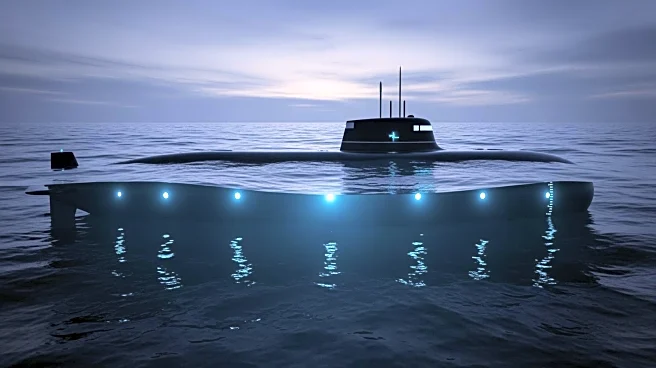What's Happening?
President Trump has approved South Korea's request to develop nuclear-powered submarines, marking a significant shift in regional military dynamics. The agreement, finalized on October 29, 2025, between
President Trump and South Korea's President Lee Jae Myung, allows South Korea to build domestic naval reactors and nuclear submarines using American-made enriched uranium fuel. This development is part of a broader trade and investment deal between the U.S. and South Korea, which includes a favorable 15 percent U.S. tariff rate to support Korean exporters. The submarines are expected to be constructed by Philadelphia Shipyards, recently acquired by South Korea's Hanwha Group, although South Korean Defense Minister Ahn Gyu-back has expressed skepticism about this plan, citing Korea's advanced shipbuilding capabilities.
Why It's Important?
The approval of South Korea's nuclear submarine program by President Trump is a strategic move that could alter the balance of power in East Asia. With China and North Korea expanding their submarine fleets, South Korea's acquisition of nuclear-powered submarines could serve as a deterrent and bolster its defense capabilities. This decision also strengthens U.S.-South Korea relations, providing economic benefits through trade agreements. However, it may provoke regional tensions, particularly with China, which views such developments as a threat. The initiative could also influence Japan, which is considering similar capabilities due to the changing security environment.
What's Next?
Japan is contemplating following South Korea's path in acquiring nuclear-powered submarines, driven by expansions in Chinese and North Korean fleets. Japan's Defense Minister Shinjiro Koizumi has expressed interest in nuclear propulsion systems, citing severe regional security conditions. This initiative, part of a new coalition government, could gain momentum and lead to long-term changes in Japan's defense strategy. Cooperation with companies like Rolls Royce for nuclear reactor technology is a possibility, reflecting Japan's cautious approach to nuclear power post-Fukushima disaster.
Beyond the Headlines
The move towards nuclear-powered submarines by South Korea and potentially Japan highlights a shift in regional military strategies, emphasizing deterrence and technological advancement. It raises ethical and environmental concerns about nuclear proliferation and the impact on regional stability. The development could lead to increased military spending and influence future diplomatic relations in East Asia.









